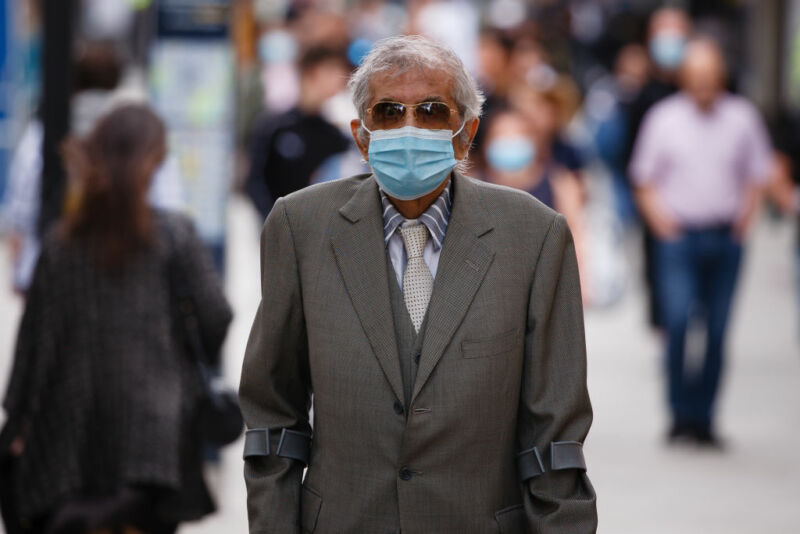
There are still a significant number of unknowns about the coronavirus—we're struggling to understand what influences the severity of some cases, why other people remain asymptomatic, and why most people experience only a subset of its total symptoms list. But one thing has been crystal clear in the data: the elderly are most at risk from COVID-19. A disproportionate number of the fatalities have come in those over 65.
As such, many countries have implemented strategies focused on minimizing the risks for the elderly, and appeals to the public have been made centered around protecting older family members. But are the elderly doing their part to protect themselves? Not really, according to a study that analyzed survey data from dozens of countries.
Following advice?
The work was done by Jean-François Daoust, a researcher at the University of Edinburgh. Daoust took advantage of a huge collection of survey data obtained by YouGov and Imperial College London. The dataset is enormous. While Daoust had to exclude India and China, where the population surveyed wasn't representative of the country's demographics, he was still left with over 72,000 people in 27 countries (Africa is notably unrepresented, and the only South American country is Brazil.) While his main conclusions are drawn from the data as a whole, Daoust also did country- and region-level analyses to look for differences in attitudes.
His basic approach to the data is quite simple. He treats various questions in the survey as ways of determining if people are following the advice of public health experts. He then checks whether the rate of compliance with this health advice changes with age.
Among the questions asked in the survey are ones about whether people are willing to self-isolate if they experience symptoms and whether they'd do so if asked to by a government official or health expert. There were also a set of questions about specific behaviors, like wearing a face mask or having guests over. Daoust both combined these into a behavioral index and analyzed them individually.
What would he expect? In an ideal world, older people would be aware of their elevated risk and act accordingly, so we'd see compliance with health advice increasing if we plotted it against age. But it's not clear whether Daoust is optimistic about seeing that pattern. "If my grandmother was alive," he writes in the introduction, "it would have been very hard to convince her not to go out and play cards at the social club even if the head of the government (that she voted for!) was urging elderlies to stay home."
Neutral at best
As you might hope for, willingness to self-isolate with the onset of symptoms increased steadily with age. Until the age of 75, that is, at which point it took a sudden downward trend. (Data for people over 80 is iffy, as there were so few included in this survey.) People were more likely to agree to self-isolate when asked to by a health expert or the government, even at young ages. But willingness to do so increased gradually up to the age of 60, at which point it went flat.
Beyond self-isolation, are those most at risk engaged in self-protective behaviors? Yes and no. If you average over all behaviors, the answer is an emphatic no, as the trend with age is indistinguishable from flat. But there are a few specific behaviors with clear and positive trends: avoiding public transit and small gatherings, as well as not having guests over. But people more than offset that by a willingness to wear masks, which is highest in the 20-30 age group and plunges from there. That turned out to be the strongest age association in the survey data.
To check whether these results were solid, Daoust redid the analysis several times, controlling for things like how long into the pandemic different countries were surveyed and looking for whether there were any between-country or within-country differences. None of these changed the outcomes significantly.
This doesn't appear to be a matter of awareness of their status. Daoust cites a survey of US residents done by Pew that indicates the elderly are more likely to consider COVID-19 a serious crisis and threat to people's health. Given how frequently it's emphasized by public health authorities in other countries, it's likely that the United States isn't unique in this regard. Yet these individuals don't appear to be acting on this knowledge.
With the video emerging of crowded bars and swimming areas, there's been a bit of a public perception that the US' problems are being driven by a younger generation indifferent to protecting its elderly. While there is an element of that going on—most measures do increase with age and peak in those near retirement—the results make it clear the problem goes well beyond the US, and the elderly aren't necessarily interested in helping themselves.
PLOS ONE, 2020. DOI: 10.1371/journal.pone.0235590 (About DOIs).
reader comments
356